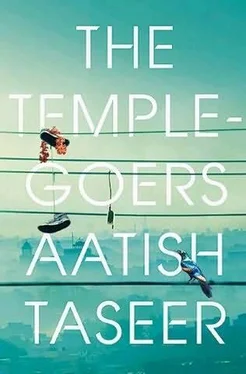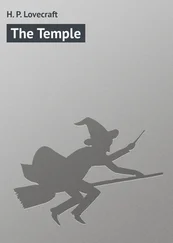
Aatish Taseer
The Temple-Goers
© 2010
‘I will tell you a fact, gentlemen,’ he went on in the same tone as before, that is, with extraordinary warmth, but at the same time he was virtually laughing, possibly even at his very words – ‘a fact the observation and discovery of which I have the honor of ascribing to myself alone; at least, nothing has been said or written about it. The fact expresses the whole essence of Russian liberalism of the sort of which I am speaking. In the first place, what is liberalism, speaking generally, but an attack (whether justified or mistaken is another question) on the established order of things? That’s so, isn’t it? Well, my fact consists in this – that Russian liberalism is not an attack on the existing order of things, but is an attack on the very essence of our things, on the things themselves, not merely on the order; not on the Russian way, but on Russia itself… But at the same time, this is such a fact as has not existed or occurred anywhere at any time since the world began, not among any single people, and therefore this fact is incidental and may pass, I admit. There cannot be such a liberal anywhere else who would hate his very fatherland. How can we explain it among us? Why, by the same thing as before – that the Russian liberal is, as yet, not a Russian liberal; by nothing else, to my mind.’
The Idiot , Fyodor Dostoevsky
It was just after dinner and on one of the news channels the murder was re-enacted. There was a clap of studio thunder on one side of the split screen, a flash of strobe lightning, the glint of a knife. A hooded figure, his clean-shaven face partly in shadow, pursues a fat girl through a keekar forest. Suspenseful music, punctuated by the crashing of cymbals, plays in the background. The darkened figure catches up with the girl; her eyes widen, her wet lips part in a scream. He plunges a knife into her body at various points. In the next scene, he cuts up her body with a kitchen knife, putting great handfuls of flesh into black bin bags, four in total. Then tying them together, he sets them afloat on a hyacinth-choked canal in whose dark water the red lights of a power station are reflected. On the other side of the split screen a passport-size picture of the girl flashes above the caption ‘1982-2008’. She’s laughing, her milky, rounded teeth exposed. She seems so unsinkable. I could almost hear her saying, ‘I’m twenty-six, running twenty-seven.’
I sat in my stepfather’s study in Alibaug. It was a high, tree house-like room with ceiling-to-floor windows. Outside, the garden was still, the night punctured at even intervals by white path lights. Beyond the shadows cast by tall, fleshy plants was the sea. It came almost to the garden wall at night and its roar carried up to the room. I turned off the television and the various lamps in the room and made my way down a flight of modern wooden steps with no banister.
Downstairs, a sea breeze carrying cold currents made its way on to the tiled veranda. The Bombay winter. A deceptively mild wind for two weeks in the year, bringing clear skies and disease. The city was sometimes visible beyond the short stretch of water and its outline made Alibaug’s mainland villages, with their pale yellow houses and red-tiled roofs, blackening in the sea air, seem like the island.
I sat down in a planters chair and called Sanyogita. There had been trouble between us in the past few days, but I thought the worst was over. Two days before she’d asked me not to call so much, then the following night she’d written, ‘I am blessed to have you in my life but I need to fulfil the rest of it. You’ve been doing that for yourself for some time and you are an inspiration for having done it. I’m off to Mars now.’ I had focused on her saying she was blessed to have me in her life and on the Mars reference, suggesting higher spirits. She only ever referred to interplanetary travel when she was in a good mood. But hearing her voice now, I realized I had misread her state of mind. She was in a taxi on her way somewhere, and frantic.
‘It’s not working, baby; it’s not working.’
‘Sanyogita, you can’t end a two-year relationship on the telephone. And not in a cab.’ It was an old technique: undercutting her good emotion with cold reason. She became quiet.
‘I’ll come,’ I added.
I took her silence to mean consent, but she said, with uncharacteristic firmness, ‘I won’t call you for a while now. I’ll need my time.’
I became agitated. ‘Sanyogita, this is no way to end this. I’ll come on the first flight tomorrow.’
She said something to the taxi driver. The interruption, though momentary, gave me my first intimation of life without her. Her voice returned, its timbre unstable, now strong, now sobbing faintly. Not so long ago, it would have irritated me. But wounded for the last time on my behalf, it felt like one more thing I had taken for granted.
‘I’m going to hang up now,’ she said abruptly.
‘Sanyogita, listen…’ I whispered, aware of a tremor in my own voice.
For a moment I held her attention.
‘Why are you doing this?’
It was a foolish thing to say. Her reasons must have flooded back. She seemed to recall a formulation she had meant to use. ‘My feelings have changed. I can’t compete with the other intimacies in your life.’
When we hung up, my first thought was to cheat the panic that grew in me. It was not late; the night was bright; it would feel very long if I couldn’t sleep. Like a man holding his breath, I went up to my room, got straight into bed and tried to sleep.
My mistake was to wonder what the date was. It was an unplanned admission of finality. No sooner had I plotted that point than my mind was prised open to other dates. Two years to the month nearly. A meeting in London. A year spent there, a happy year of work and study, of little-known restaurants, cinemas and bright international friends. Sanyogita was haunted by the happiness of that year. Then the year in Delhi, beginning in those hot months of flowers. The year when Aakash moved like a planet over our lives.
My sheets were warm, crushed; my bed was an alluvial mess.
I went downstairs. The lights of the Balinese fantasy house pierced me from every direction. They each had their barbs: the sharpness of the halogen spot; the sickly glare of the fluorescent path light; smoked glass and lizards on the wall. I poured myself a large whisky, lit a cigarette and sank into a planters chair on the veranda. But I was not a smoker and soon the fraudulence of the gesture defeated me. Then the phone calls began, to friends and family; repeated, abortive attempts at sleep; the hotness of the sheets; the impotence of air-conditioning; the sexual arousal of fear and panic; an orgasm before the glare of a computer at three a.m.
My last memory was of an orange moon, heavy and low, seeming not so much to sink as to slip over the water, fragment and float away.
*
I left the next morning. The road curled out from the coast to the jetty. We went past houses with open verandas and fairy lights; the foliage was bright and dense and encroaching.
At the jetty the sea was unseasonably rough. A row of pale clouds kept a purple, sepulchral sky in place. A ferry had trouble mooring. Its low white body crept up to the jetty’s cement steps and was thrown back. Each time a chasm of greenish-brown water opened up. Women in pink and mauve saris wrapped twice about themselves shrieked. One man grabbed on to the ferry’s second-storey railings, but then couldn’t lift himself up and was nearly crushed against the jetty steps. At length he was rescued and the men watching laughed. Then again the wooden ferry and the barnacled jetty tried closing over the stretch of rough water. A column of nervous passengers crossed hurriedly. The jetty’s cement pillars, showing exposed iron in places, cast gloomy shadows over the water racing between their legs.
Читать дальше













